Zygote - Guides d'étude, Notes de cours & Résumés
Vous recherchez les meilleurs guides d'étude, notes d'étude et résumés sur Zygote ? Sur cette page, vous trouverez 3036 documents pour vous aider à réviser pour Zygote.
Page 4 sur 3.036 résultats
Trier par
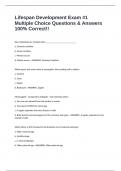
-
Lifespan Development Exam #1 Multiple Choice Questions & Answers 100% Correct!!
- Examen • 14 pages • 2024
-
Disponible en pack
-
- €13,76
- + en savoir plus
New individuals are created when ___________________________ a. Gametes combine b. Genes combine c. Meiosis occurs d. Mitosis occurs - ANSWERA. Gametes Combine When sperm and ovum unite at conception, the resulting cell is called a: a. Gamete b. Gene c. Zygote d. Blastocyst - ANSWERC. Zygote Monozygotic - compared to dizygotic - twins develop when: a. Two ova are released from the mother's ovaries b. Two sperm fertilize the same egg c. A zygote separates into two clusters of ...

-
Bio 112 Exam Martin Ball State Questions and Answers Already Passed
- Examen • 26 pages • 2024
-
- €10,31
- + en savoir plus
mollusca body plan shared features -foot: mass of muscle tissue used for movement and/or manipulation -visceral mass: clump that contains most of the organs -mantle: tissue that drapes over the organ clump and secretes the shell in shelled members 4 characteristics shared by all animals -eukaryotic- membrane bound nucleus and organelles -multicellular -heterotrophic- consumes food to get energy -have tissues that develop from embryonic layers (germ layers) germ layer formation step 1 spe...

-
Bio 172 Exam 1 Questions and Answers Rated A+
- Examen • 45 pages • 2024
-
Disponible en pack
-
- €11,30
- + en savoir plus
Bio 172 Exam 1 Questions and Answers Rated A+ What are the events that take place in a sexual cycle and why is this cycle significant? - Gamete formation (1n Haploid) -Fertilization (Syngamy) of gametes. -Zygote formation. Zygote is first 2n (Diploid) cell. Then recombination occurs (Basically, Haploid cells (Gamete and spirm) form to create Diploid cell (Zygote)) What is the first supergroup? Excavata What is asexual reproduction? One parent, and offsprings are identical cl...

-
Test Bank for Introduction to Maternity and Pediatric Nursing 9th Edition BY Gloria Leifer Chapter 1-34 Newest Version 2024
- Examen • 382 pages • 2024
-
- €17,69
- 1x vendu
- + en savoir plus
INTRODUCTION TO MATERNITY AND PEDIATRIC NURSING 8TH EDITION LEIFER TEST BANK all chapters TEST BANK FOR INTRODUCTION TO MATERNITY AND PEDIATRIC NURSING, 8TH EDITION BY GLORIA LEIFER CHAPTER 1-34 COMPLETE GUIDE A+ UNIT I: An Overview of Maternity and Pediatric Nursing Chapter 1: The Past, Present, and Future UNIT II: Maternal-Newborn Nursing and Women’s Health Chapter 2: Human Reproductive Anatomy and Physiology Chapter 3: Fetal Development Chapter 4: Prenatal Care and Adaptations to Pregnancy ...
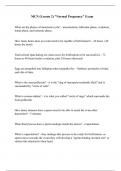
-
MCN (Lesson 2) "Normal Pregnancy" Exam
- Examen • 25 pages • 2024
-
- €9,83
- + en savoir plus
What are the phases of menstrual cycle? - menstruation, follicular phase, ovulation, luteal phase, and ischemic phase. How many hours does an ovum need to be capable of fertilization? - 24 hours. (48 hours the most). Total critical span during sex must occur for fertilization to be successful is - 72 hours or 48 hours before ovulation, plus 24 hours afterward. Eggs are propelled into fallopian tubes (ampulla) by: - fimbriae, peristalsis of tube, and cilia of tube. What is the zona pelluc...
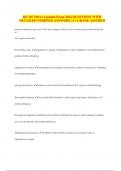
-
Bio 107 Oliver Ljustina Exam 2024 QUESTIONS WITH DETAILED VERIFIED ANSWERS | A+ GRADE ASSURED
- Examen • 16 pages • 2024
-
Disponible en pack
-
- €12,27
- + en savoir plus
Bio 107 Oliver Ljustina Exam 2024 QUESTIONS WITH DETAILED VERIFIED ANSWERS | A+ GRADE ASSURED macroevolutionary processes Large changes which occur over long time periods and result in new species describe Ernst Mayr said: population or group of populations whose members can interbreed and produce fertile offspring reproductive barrier interruption in courtship, fertilization, embryo formation or offspring developmenreproduct prezygotic barriers barriers occur before the formation of th...
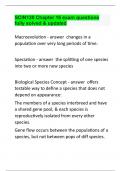
-
SCIN130 Chapter 16 exam questions fully solved & updated
- Examen • 18 pages • 2024
-
Disponible en pack
-
- €14,74
- + en savoir plus
Macroevolution changes in a population over very long periods of time. Speciation the splitting of one species into two or more new species Biological Species Concept offers testable way to define a species that does not depend on appearance: The members of a species interbreed and have a shared gene pool, & each species is reproductively isolated from every other species. Gene flow occurs between the populations of a species, but not between pops of diff species. Biolo...
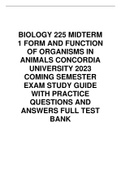
-
BIOLOGY 225 MIDTERM 1 FORM AND FUNCTION OF ORGANISMS IN ANIMALS CONCORDIA UNIVERSITY 2023 COMING SEMESTER EXAM STUDY GUIDE WITH PRACTICE QUESTIONS AND ANSWERS FULL TEST BANK
- Examen • 84 pages • 2023
-
- €12,77
- 1x vendu
- + en savoir plus
Textbook Readings Chapter _ 32 Animal Diversity Animals are multicellular, heterotrophic eukaryotes with tissues that develop from embryonic layers Animals are a diverse monophyletic group with 34 major animal phyla About 1.3 million species of animals living Three characteristics define the entire group 1. Mode of nutrition 2. Cell structure and specialization 3. Reproduction and development Nutritional Monde Animals are heterotrophs They cannot construct all their own or...
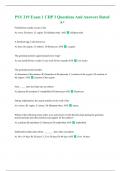
-
PSY 219 Exam 1 CHP 3 Questions And Answers Rated A+
- Examen • 5 pages • 2024
-
- €11,30
- + en savoir plus
PSY 219 Exam 1 CHP 3 Questions And Answers Rated A+ Fertilization usually occurs in the A) ovary. B) uterus. C) vagina. D) fallopian tube. ANS fallopian tube A fertilized egg is also known as A) fetus. B) zygote. C) embryo. D) blastocyst. ANS a zygote The germinal period is approximately how long? A) one month B) two weeks C) one week D) two months ANS two weeks The germinal period includes A) formation of the amnion. B) formation of the placenta. C) creation of the zygote. D) c...

-
Bootcamp.com - Developmental Biology | Questions and Correct Answers | Latest Update 2024/2025 | 100% PASS
- Examen • 34 pages • 2024
-
Disponible en pack
-
- €11,79
- + en savoir plus
B - Developmental Biology | Questions and Correct Answers | Latest Update 2024/2025 | 100% PASS where does fertilization occur? oviduct _____ is the joining of a haploid sperm nucleus and a haploid egg nucleus to form a diploid zygote fertilization fertilization is the joining of a _____ sperm and a _____ egg to form a _____ zygote haploid; haploid; diploid_____ is the final maturation step for the sperm prior to fertilization capacitation capacitation is triggered by secretions fro...

Ce résumé que vous venez d'acheter a fait très plaisir à quelqu'un. Vous voulez aussi être payé chaque semaine ? Vendez vos documents d'étude sur Stuvia ! Découvrez tout sur gagner de l'argent sur Stuvia


